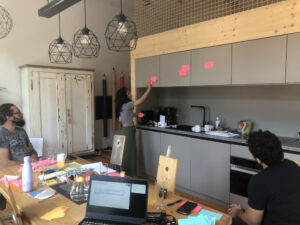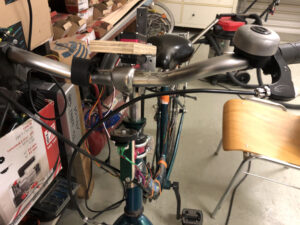Who we are



Computers have become an integral part of our everyday lives. While in the past we have used these machines only occasionally to perform calculations, manage data, run simulations, or browse the web, they are now substantially embedded in our private and working environments. Mobile devices, smart speakers, or home automation have become mass markets, but these technologies are just the beginning. Recent advances in sensing, processing, and machine learning are expected to gradually transition our world into a new era where machines take initiative and proactively approach their users, while gradually fading into sensitive application areas with societal and ethical consequences. This development is propelled by new modalities of interaction, such as voice, virtual/augmented reality, emerging sensing opportunities introspecting users, and new capabilities of predicting user needs and intentions.
Our research unit Artifact-based Computing and User Research aims at contributing to a future according to humanist traditions – empowering people and augmenting their capabilities. In particular, we focus our research on
- Research through design in transdisciplinary settings
- AI-driven assistance and companion systems
- Human-machine and human-AI cooperation in a variety of contexts
- Adaptive and attention-aware information systems
- Explainability, transparency, and accountability of AI systems
- New interaction modalities such as voice and AR/VR
- Human-centered design in all stages from ideation to implementation
- User experience design
- Co-creation of common artifacts
- Quantitative and qualitative evaluation of digital artifacts
- Societal, ethical, and gender-related implications of emerging technologies
We develop and evaluate cooperative prototypes for novel human-machine collaboration in a great variety of contexts, such as cooperative work environments, healthcare and sports, manufacturing, architecture and urban planning, industrial shop floors, automated/assisted driving and mobility, or mundane everyday life decision-making. These prototypes anticipate future developments, help explore corresponding user experiences, and seek to merge sociological research with a practical contribution to the design of information systems. At the heart of our work is a methodological commitment to participation and use as well as to understanding the implications of IT systems on work, organization, communication, and social change. Our research and teaching are informed by an integrated, multi-disciplinary, life-centered approach.
Mission
We believe in humans being in the center of human-machine interaction. We conceptualize and evaluate systems that free users from routines and foster humane ingenuity: critical thinking, creativity, and dealing with uncertainty.
Vision
We develop novel human-machine collaboration for cooperative work environments, healthcare and sports, manufacturing, architecture and urban planning, industrial shop floors, automated/assisted driving and mobility, or mundane everyday life decision-making.
Values
- informed by practical needs
- guided by fundamental research questions
- driven by passion and dedication